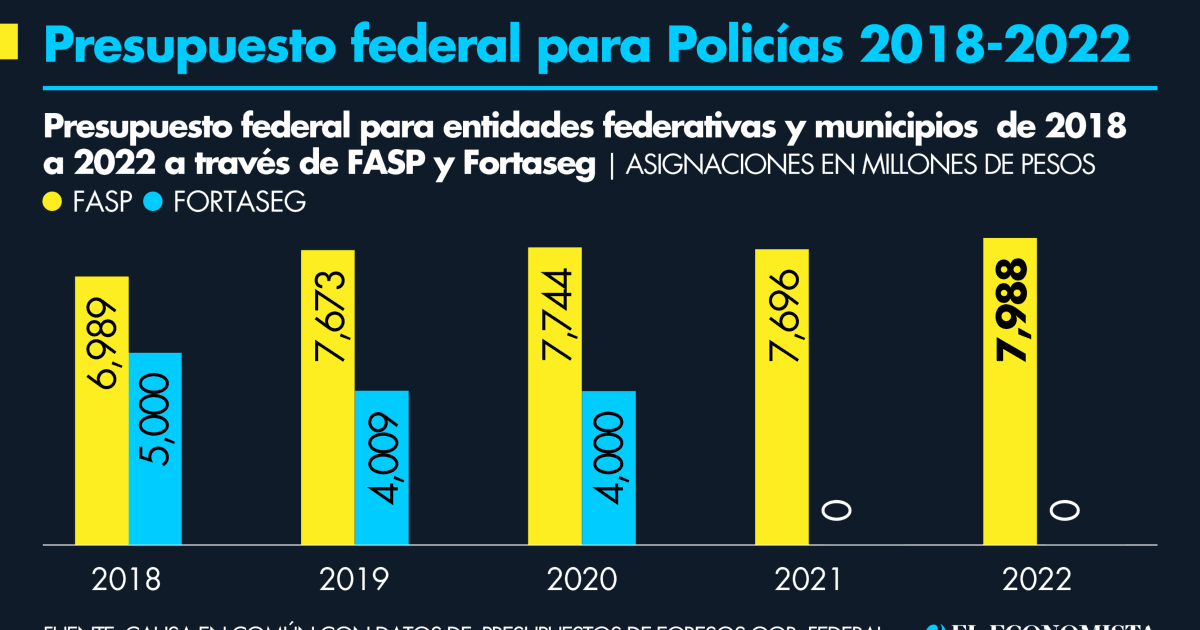While the public discussion focuses on the military nature of the National Guard (GN) and how long the armed forces should remain deployed throughout the national territory in security tasks, the state and municipal police continue to deteriorate. Today those corporations, with few exceptions, are in worse conditions than they were at the beginning of the current federal administration, due to cut budgets and lack of attention.
Francisco Rivas, general director of the National Citizen Observatory (ONC), explained that it is very important to have well-functioning state and municipal police, because not all crimes are federal.
The National Guard can assist in actions and the Army is doing so, but the ones who must attend to the citizen’s security problems are the local police throughout the country.
In that sense, he stressed that the current situation of the state and municipal police is very worrying, because the federal government is only considering keeping the armed forces in security tasks, without doing anything to remedy the deficiencies of local corporations. “Unfortunately, in this six-year term, investment in them has ceased.”
For his part, Genaro Ahumada, a researcher with the Common Cause organization, affirmed that the country’s public security policy does not have the necessary budget to generate the mechanisms and strategies that give Mexicans the security they deserve.
The budget for security that is exercised in the states is made up of the items of the Contribution Fund for Public Security (FASP) and, until 2020 (because the government of President Andrés Manuel López Obrador eliminated it), the subsidy of the Program of Strengthening for Security (Fortaseg).
According to the General Law of the National Public Security System (SNSP), these resources must be sufficient for the development of institutional capacities at the municipal and state levels, for the implementation of violence prevention policies, for police development, infrastructure, equipment, among others, but currently that is not fulfilled.
In this sense, Ahumada highlighted that from 2018 to 2022, in real terms, the FASP has remained stagnant and the Fortaseg disappeared, despite the levels of violence recorded in the country.
In 2018, the FASP had a budget of 6,989 million pesos and for 2022 it was 7,988 million, while the Fortaseg went from 5,000 million pesos in 2018 to 4,000 million in 2021 and for 2021 and 2022 no resources were allocated.
In the Federation Expenditure budget project for 2023 that Congress analyzes, it considers assigning 8,786 million pesos to the FASP.
Meanwhile, the Secretaries of National Defense (Sedena) and the Secretary of the Navy (Semar) have obtained more influence, political power and budget. So far in the current six-year term, the federal government has increased the Sedena’s budget by almost 40%, the Navy’s 12% and the National Guard’s 18%.
According to the study “The situation of the police in Mexico 2018-2022”, carried out by Common Cause, resources are not only insufficient to meet the basic needs of a police force, but are also significantly reduced, while most of high-impact crimes continue to rise or remain at extremely high levels, and the budget allocated to the armed forces is increasing.
Francisco Rivas drew attention to the fact that in the draft budget for expenditures for 2023 we can see how the resources allocated to the state police and the prosecutor’s offices were reduced between 20 and 40 percent.
In addition, we have spent three years without allocating federal resources to strengthen the municipal police.
He said that there is a responsibility of the federal government, the Congress of the Union, but also of state authorities, because they do not allocate a budget to the police, mainly because since they do not make an effort to collect taxes, they do not have resources for security.
They breach commitments to strengthen corporations
Miguel Garza Flores, executive director of the Institute for Security and Democracy, AC (Insyde) recalled that in the transitory articles of the law that gives rise to the National Guard, it is established that in a period of five years the police should be strengthened local. Specifically, it is mandated to strengthen operational and institutional capacities.
What happened was that the federal government concentrated on propping up the National Guard and neglected the state police.
He said that there are governors who prefer that the federal government resolve the problem of insecurity in their entities and abandon their police officers, which is reflected both in insecurity and in the working conditions of police officers.
In this sense, the report “National Guard 3 years of militaristic definition”, carried out by Common Cause, indicates that the law that creates the National Guard in its fifth transitory article establishes the obligations of the federal entities for the strengthening of the state and municipal police. .
The seventh transitory article established a term of 180 days, from the entry into force of the reform for the federal entities to present the diagnosis and the program to increase the state of force, as well as the institutional capacities of their respective state police forces. and municipal.
It also established the obligation for the states to establish the “budget forecasts” for its fulfillment, and from the following year after the entry into force of the order, they report each year to their respective Congresses on progress in these items.
In 2020, 30 entities delivered their diagnosis, missing Baja California Sur and Zacatecas; 27 delivered their strengthening program, missing Baja California, Baja California Sur, Jalisco, San Luis Potosí and Zacatecas; and 20 submitted their budget proposal, except for Aguascalientes, Baja California Sur, Campeche, Mexico City, Coahuila, Colima, Jalisco, Michoacán, Nuevo León, San Luis Potosí, Veracruz and Yucatán.
For 2021, 30 entities submitted their diagnosis, 29 their strengthening program and 22 their budget proposal. Regarding the obligation to present their annual reports to local Congresses, the SESNSP indicated that, in 2020, three entities did not comply (Baja California, Baja California Sur and Zacatecas), and by 2021, only 14 entities had complied.















